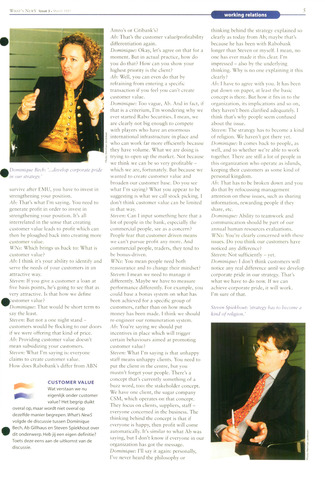i-
WHAT'S NewS Issue 3 March 1997
working relations
5
Dominique Bech: '...develop corporate pride
in our strategy.
survive after EMU, you have to invest in
strengthening your position.
Ab: That's what I'm saying. You need to
generate profit in order to invest in
strengthening your position. It's all
interrelated in the sense that creating
customer value leads to profit which can
then be ploughed back into creating more
customer value.
WNs: Which hrings us back to: What is
customer value?
Ab: I think it's your ability to identify and
serve the needs of your customers in an
attractive way.
Steven: If you give a customer a loan at
five basis points, he's going to see that as
very attractive. Is that how we define
hpustomer value?
Dominique: That would be short term to
say the least.
Steven: But not a one night stand -
customers would be flocking to our doors
if we were offering that kind of price.
Ab: Providing customer value doesn't
mean subsidizing your customers.
Steven: What I'm saying is: everyone
claims to create customer value.
How does Rabobank's differ from ABN
CUSTOMER VALUE
Wat verstaan we nu
eigenlijk onder customer
value? Het begrip duikt
overal op, maar wordt niet overal op
dezelfde manier begrepen. What's NewS
volgde de discussie tussen Dominique
Bech, Ab Gillhaus en Steven Spiekhout over
dit onderwerp. Heb jij een eigen definitie?
Toets deze eens aan de uitkomst van de
discussie.
Amro's or Citibank's?
Ab: That's the customer value/profitability
differentiation again.
Dominique: Okay, let's agree on that for a
moment. But in actual practice, how do
you do that? How can you show your
highest priority is the cliënt?
Ab: Well, you can even do that by
refraining from entering a specific
transaction if you feel you can't create
customer value.
Dominique: Too vague, Ab. And in fact, if
that is a criterium, I'm wondering why we
ever started Rabo Securities. I mean, we
are clearly not big enough to compete
with players who have an enormous
international infrastructure in place and
who can work far more efficiently because
they have volume. What we are doing is
trying to open up the market. Not because
we think we can be so very profitable -
which we are, fortunately. But because we
wanted to create customer value and
broaden our customer base. Do you see
what I'm saying? What you appear to be
suggesting is what we call stock picking. I
don't think customer value can be limited
in that way.
Steven: Can I input something here that a
lot of people in the bank, especially the
commercial people, see as a concern?
People fear that customer driven means
we can't pursue profit any more. And
commercial people, traders, they tend to
be bonus-driven.
WNs: You mean people need both
reassurance and to change their mindset?
Steven: 1 mean we need to manage it
differently. Maybe we have to measure
performance differently. For example, you
could base a bonus system on what has
been achieved for a specific group of
customers, rather than on how much
money has been made. 1 think we should
re-engineer our remuneration system.
Ab: You're saying we should put
incentives in place which will trigger
certain behaviours aimed at promoting
customer value?
Steven: What I'm saying is that unhappy
staff means unhappy clients. You need to
put the cliënt in the centre, but you
mustn't forget your people. There's a
concept that's currently something of a
buzz word, too: the stakeholder concept.
We have one cliënt, the sugar company
CSM, which operates on that concept.
They focus on clients, suppliers, staff -
everyone concerned in the business. The
thinking behind the concept is that if
everyone is happy, then profit will come
automatically. It's similar to what Ab was
saying, but I don't know if everyone in our
organization has got the message.
Dominique: I'll say it again: personally,
I've never heard the philosophy or
thinking behind the strategy explained so
clearly as today from Ab; maybe that's
because he has been with Rabobank
longer than Steven or myself. I mean, no
one has ever made it this clear. I'm
impressed - also by the underlying
thinking. Why is no one explaining it this
clearly?
Ab: I have to agree with you. It has been
put down on paper, at least the basic
concept is there. But how it fits in to the
organization, its implications and so on,
they haven't been clarified adequately. I
think that's why people seem confused
about the issue.
Steven: The strategy has to become a kind
of religion. We haven't got there yet.
Dominique: It comes back to people, as
well, and to whether we're able to work
together. There are still a lot of people in
this organization who operate as islands,
keeping their customers as some kind of
personal kingdom.
Ab: That has to be broken down and you
do that by refocussing management
attention on these issues, such as sharing
information, rewarding people if they
share, etc.
Dominique: Ability to teamwork and
communication should be part of our
annual human resources evaluations.
WNs: You're clearly concerned with these
issues. Do you think our customers have
noticed any difference?
Steven: Not sufficiently - yet.
Dominique: I don't think customers will
notice any real difference until we develop
corporate pride in our strategy. That's
what we have to do now. If we can
achieve corporate pride, it will work.
I'm sure of that.
Steven Spiekhout: 'strategy has to become a
kind of religion.'

